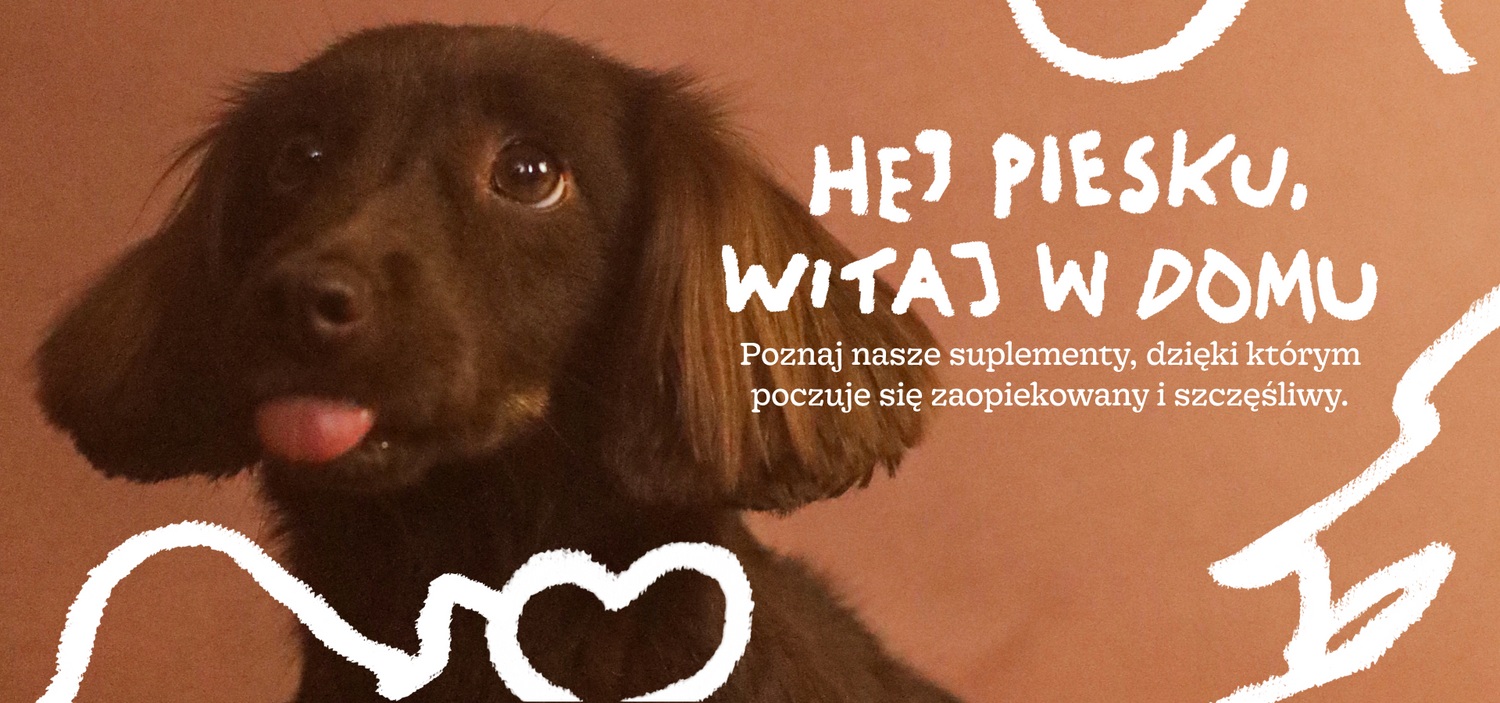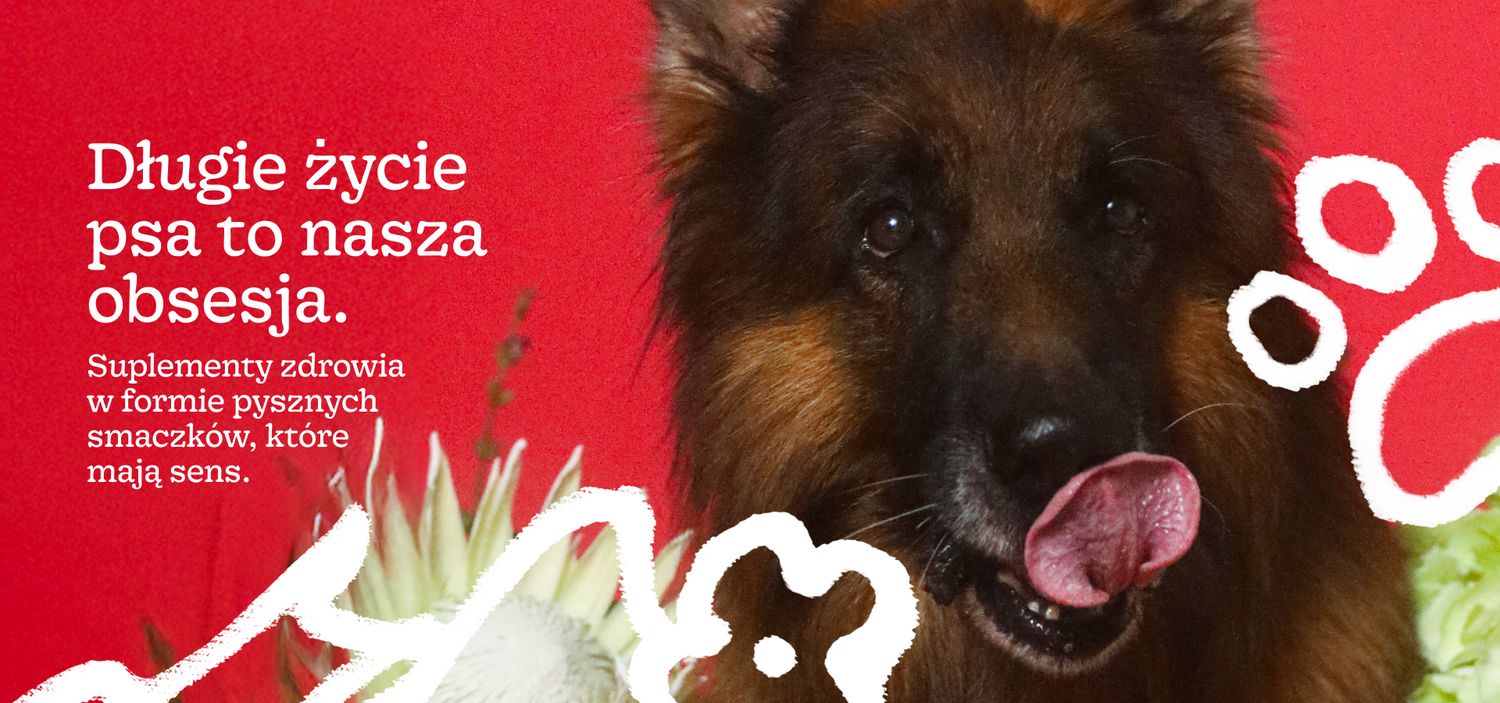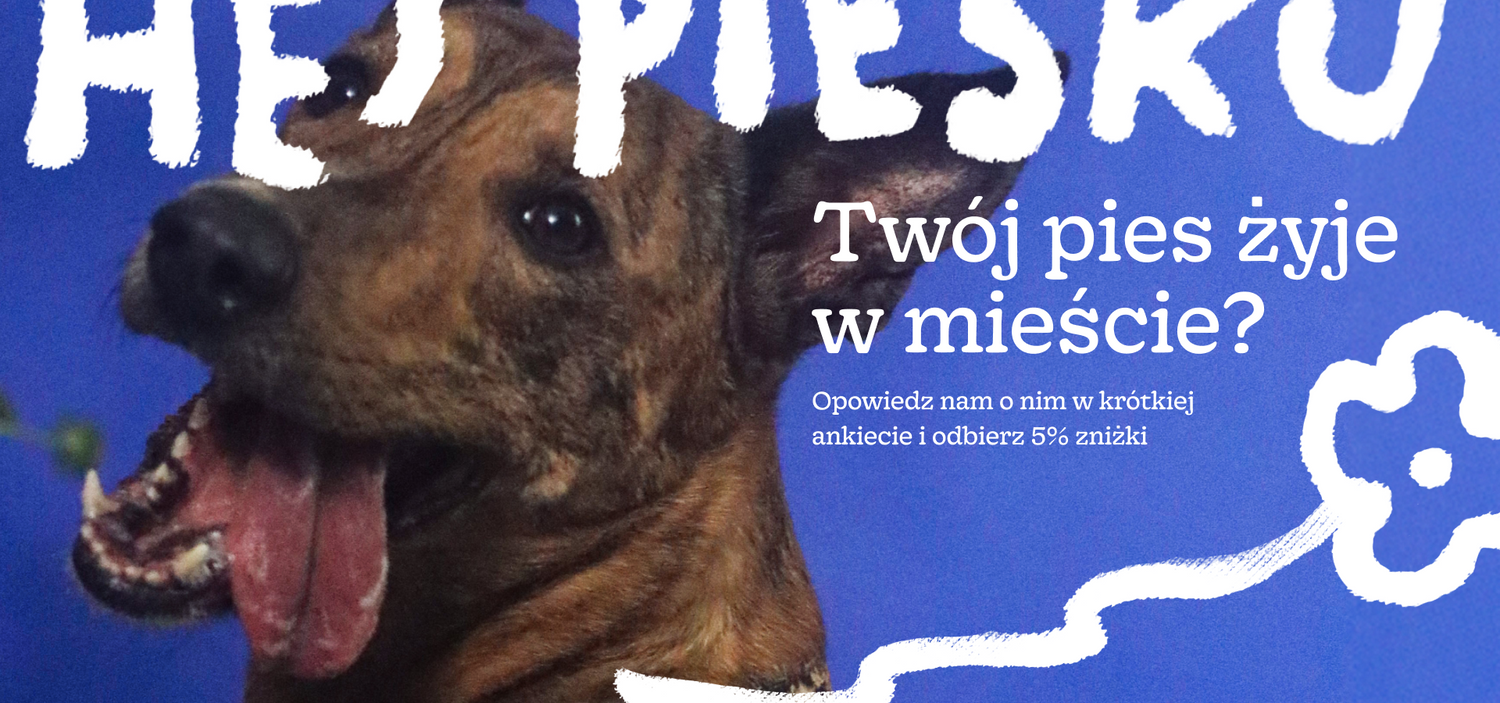


Suplementy dla Twojego psa
Nauka to podstawa
Stawiamy na naturalne składniki wspierane nauką. Wybieramy substancje, które wykazują obiecujący potencjał w badaniach naukowych, a ich korzystne działanie jest badane i dokumentowane. Każda formuła to przemyślane połączenie tego, co najlepsze w naturze, z tym, co potwierdza współczesna nauka o zdrowiu psów.

Dlaczego smaczki?
Dlaczego smaczki?
Wiemy, co psy myślą o tabletkach i niesmacznych proszkach. Chcemy, żeby dawanie psu zdrowia kojarzyło mu się dobrze, z radością, zabawą, budowało więź z opiekunem. Zależy nam, żeby towarzyszyć Wam w tych chwilach.
Bezpieczeństwo to podstawa
Bezpieczeństwo to podstawa
W świecie, w którym mało kto stawia na jakość, my nie chodzimy na kompromisy. Badamy naszych dostawców w zewnętrznym laboratorium (wybieramy najlepszych, ufamy, ale sprawdzamy), każdy z naszych produktów przechodzi ponad 100 punktów kontroli. Twój pies dostaje od nas w 100% bezpieczne produkty.
Najlepsi specjaliści
Najlepsi specjaliści
Chociaż początki naszej marki miały miejsce w domowej kuchni, nasze receptury dopracowali najlepsi specjaliści. Każdy produkt poprzedzony jest wielomiesięcznym researchem na temat skuteczności i potencjału.
Mądry skład
Mądry skład
Wierzymy, że wiele chorób i procesów starzenia można odsunąć w czasie mądrą suplementacją i zdrowym trybem życia, a nawet w ogóle do nich nie dopuścić. Żeby tak się stało, trzeba rozumieć organizm psa i jego potrzeby oraz być na bieżąco z najnowszymi badaniami. To nasz priorytet.

Nasi eksperci
Żywieniem psów i kotów fascynuje się od 2014 roku – to jej prawdziwa pasja! Absolwentka SGGW w Warszawie, gdzie zgłębiała tajniki dietetyki zwierząt. Od ponad 4 lat z sukcesem prowadzi gabinet dietetyczny pomagając czworonogom odnaleźć energię i świetną formę. Łączy wiedzę o żywieniu z fizjoterapią, tworząc plany, które naprawdę działają. Chętnie dzieli się swoją wiedzą jako autorka tekstów branżowych. W Hej Piesku odpowiada za receptury i wspiera nas edukacyjnie.
Nasi piękni ambasadorzy
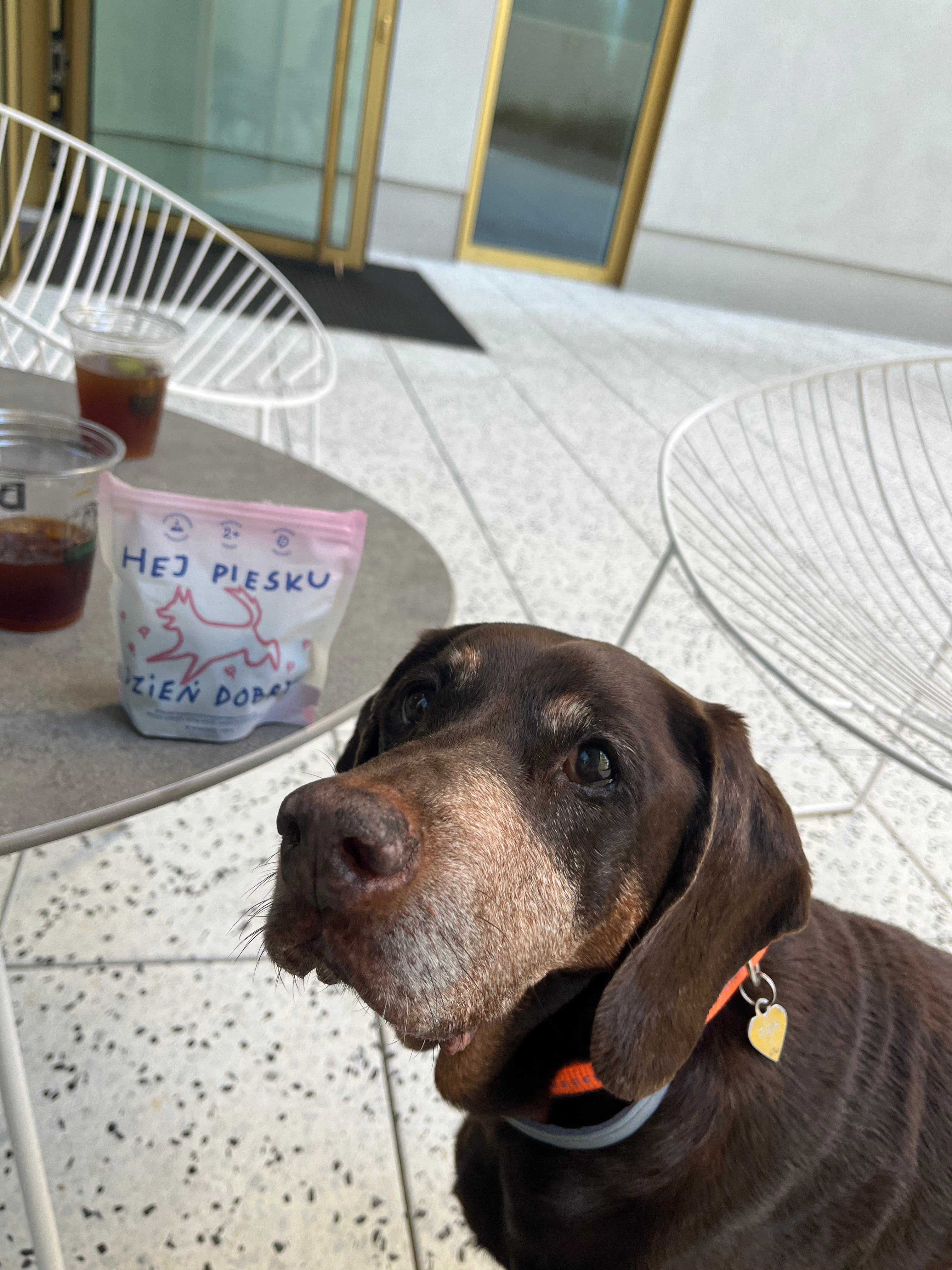
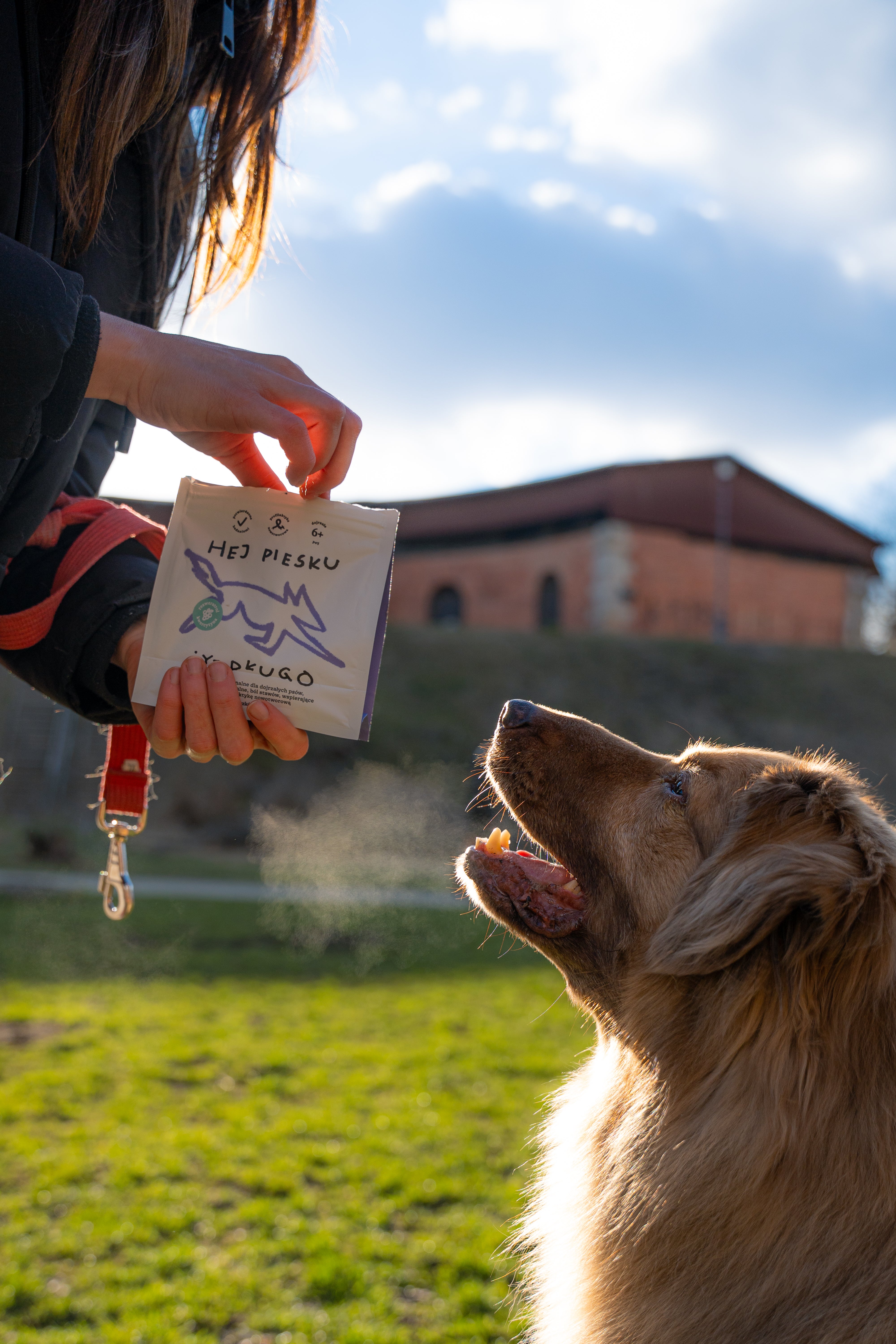
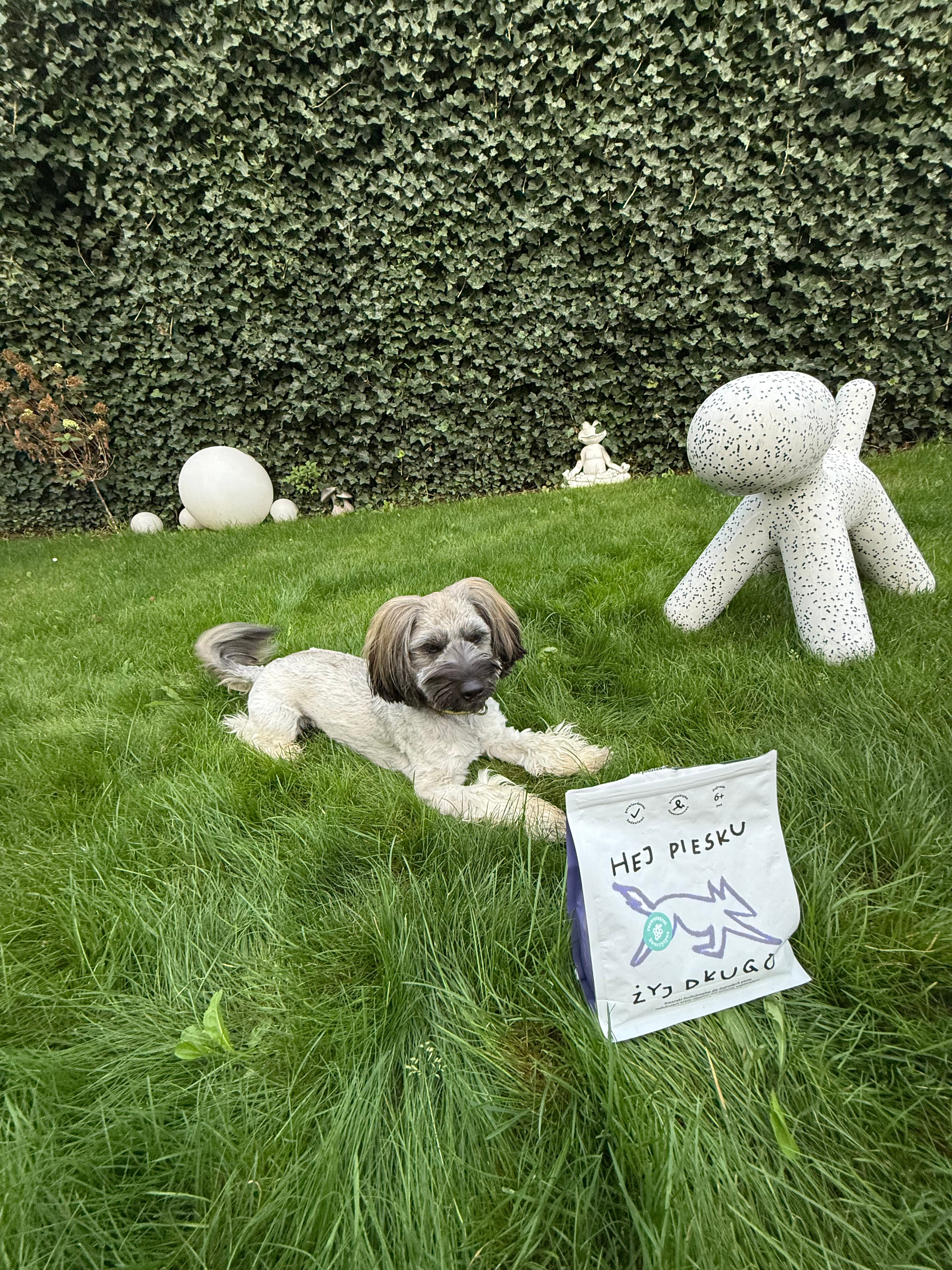
Pytania i odpowiedzi
Dla jakich psów przeznaczone są Wasze suplementy?
Dla jakich psów przeznaczone są Wasze suplementy?
Nasze produkty sprawdzą się zarówno u dorosłych (2+), jak i seniorów. Formuły są opracowane tak, aby były bezpieczne i wspierały codzienną dietę psa, niezależnie od rasy czy wielkości. Każdy suplement wspiera inne potrzeby, o których więcej przeczytasz na karcie danego produktu.
Czym są półwilgotne smaczki zdrowia?
Czym są półwilgotne smaczki zdrowia?
To naturalne suplementy w formie miękkich kąsków, które łączą przyjemność podawania smakołyku z funkcjonalnym wsparciem zdrowia psa. Każdy składnik został dobrany z myślą o realnych potrzebach psów – od odporności, przez stawy, po zdrową skórę i sierść.
Jak podawać psu suplementy?
Jak podawać psu suplementy?
Wystarczy traktować je jak codzienny rytuał – podawać zgodnie z zalecaną porcją, najlepiej w trakcie posiłku lub jako nagrodę. Dzięki wilgotnej konsystencji psy przyjmują je chętnie i bez stresu.
Gdzie powstają Wasze produkty?
Gdzie powstają Wasze produkty?
Smaczki produkujemy w Polsce, we współpracy z doświadczonymi technologami i dietetykami. Każda partia przechodzi kontrolę jakości, żeby spełniała najwyższe standardy bezpieczeństwa.
Czy mogę podawać je razem z innymi suplementami lub karmą specjalistyczną?
Czy mogę podawać je razem z innymi suplementami lub karmą specjalistyczną?
Tak, nasze formuły uzupełniają dietę psa i są bezpieczne w większości przypadków. Wyjątkiem są psy z problemami trzustki – ze względu na zawartość tłuszczu suplementację trzeba wtedy ściśle kontrolować. Niezależnie od sytuacji, każdą dodatkową suplementację powinno się skonsultować z lekarzem weterynarii lub dietetykiem.
Czy smaczki można podawać codziennie przez dłuższy czas?
Czy smaczki można podawać codziennie przez dłuższy czas?
Tak, nasze formuły są stworzone do regularnego stosowania – najlepsze efekty pojawiają się właśnie przy codziennej suplementacji. Każdy składnik został dobrany tak, by wspierał zdrowie psa w sposób bezpieczny i długofalowy.
Warto wiedzieć (więcej)
Twisted stomach in dogs – a silent killer you need to know about
Stomach torsion, also known as gastric dilatation and volvulus (GDV), is one of the most dangerous and sudden conditions that can affect a dog. It is the responsibility of every owner to know how to recognize the problem, what causes it, and – most importantly – how to protect their dog from this threat. What is stomach torsion? Stomach torsion is a condition in which a dog's stomach fills with gas, food, or fluids, and then twists on itself. This twisting causes the closure of the stomach outlet and pressure on adjacent organs, leading to circulatory disturbances, hypoxia, and shock. Without prompt veterinary intervention, GDV is usually fatal. Where does stomach torsion come from? Although the exact cause of GDV is not fully understood, studies indicate several risk factors: Genetics and anatomy: Breeds with deep chests are particularly at risk. Age: Older dogs, especially those over 7 years old, are more susceptible. Fast eating and swallowing air: Dogs that eat greedily may be at greater risk. Physical activity after a meal: Intense activity right after eating increases the risk of torsion. Stress: Dogs exposed to stress may be more susceptible to this problem. Which breeds are at risk? Dogs of large breeds with deep chests are most at risk, including: German shepherd Great Dane Irish setter Labrador retriever Golden retriever Boxer Saint Bernard Newfoundland Afghan hound Weimaraner Airedale terrier Borzoi It's also worth remembering that even medium-sized dogs, such as the English bulldog, can be at risk if they have a specific anatomical structure or other genetic predispositions. Symptoms that should concern you Gastric torsion develops quickly, so knowing the symptoms is key to saving your dog's life. Pay attention to: Abdominal swelling and hardness to the touch. Anxiety, drooling, difficulty breathing. Dry heaving (without stomach contents). Rapid weakness, apathy, or collapse. If you notice these symptoms, act immediately. Stomach torsion requires urgent surgical intervention. How to prevent stomach torsion? Although risks cannot be completely eliminated, you can take steps that significantly reduce them: Feeding the dog an appropriately sized portion Serve meals in smaller portions, but more frequently (3/4 times a day). Use slow-feed bowls so the dog doesn't eat too greedily. Avoid activity after eating Allow the dog to rest for at least 1–2 hours after a meal. Also, avoid feeding immediately after an active walk. Stress reduction Create a calm environment, especially during feeding. The dog should have its own fixed, safe place for meals. Consultations with a veterinarian For dogs in at-risk groups, consider a preventive gastropexy procedure (attaching the stomach wall to the abdominal wall), which prevents the stomach from twisting. What should a dog's diet look like? Diet plays a key role in the prevention of GDV. It should be easily digestible and free of ingredients that cause fermentation in the intestines. Principles of composing a light diet: High-quality protein: Easily digestible meat, such as turkey, chicken, or lamb, provides easily absorbable protein. Low-FODMAP carbohydrates: Choose low-fermentation ingredients, such as white rice, millet, sweet potatoes, or pumpkin. Avoid corn, soy, wheat, and legumes. Healthy fats: In small amounts, fats aid in the absorption of nutrients, but avoid fatty meals. Can supplementation help? Supplements that support digestion and the overall condition of the dog are an important part of the diet. It is worth including: Probiotics and prebiotics: Support healthy gut flora, which affects proper digestion. Digestive enzymes: Help in the breakdown of food, reducing the risk of bloating. Omega-3: Reduce inflammation and support the overall health condition of the dog. Resveratrol and quercetin: Natural compounds with anti-inflammatory and antioxidant properties that can support digestive health and reduce oxidative stress in older dogs. Lion’s Mane (Hericium erinaceus): An adaptogen that supports immunity and the functioning of the nervous system. It may also improve overall health condition and body recovery. L-carnitine: Supports heart and muscle function in older dogs. How to react in a crisis situation? If you suspect gastric torsion, time is crucial. Do not try to treat your dog yourself – go to the nearest clinic immediately. On the way, try to keep your dog lying down and provide them with calm. Gastric torsion is a very serious condition, but the right knowledge and preventive actions can save your dog's life. Maintain a healthy diet, proper eating habits, and supplemental support, especially for dogs in at-risk groups.
Why are we doing this
We dedicated our time and hearts to ensuring that dogs live longer, feeling great even as mature dogs and seniors. We know that the aging process can be slowed down, and we are uncompromising in this approach. First, we did it for our German Shepherd Sky, who started aging too quickly after surgery, then for his friends. And now we will do it for anyone who wants to enjoy life with their dog for as long as possible. We are the first brand of dog supplements in Poland in the form of treats, which are packed to the brim with the highest quality natural ingredients, and there are plenty of them. What we are most proud of are the developed formulas for cancer prevention. The statistics are ruthless - the older the dog, the greater the likelihood of developing cancer. Instead of worrying, we prefer to act. The combination of resveratrol and quercetin, which work synergistically to inhibit the growth of cancer cells, reduce inflammation, and neutralize free radicals - you will find only with us. We believe in science and present to you over 1.5 years of research on supporting the longest possible life of a dog in good shape. Most manufacturers are focused on maximizing profit, thus lowering the quality of their products. The supplement market for both humans and animals is still not subject to any 'burdensome' regulations. There is no need to conduct raw material tests, no need to adhere to effective doses, no need to undergo tests for the presence of pesticides or heavy metals. For this reason, it was crucial for us to find a partner who shares our values - only the best for our dogs. We have over 100 quality control points for each of our ingredients, a team of the best dietitians in Poland, and verified suppliers. Our dogs test every product variant; this is a sufficient reason for us to ensure the product is safe and of the highest quality. As dog owners, we know how troublesome powders or tablets can be - the convenience of administration and the ability to reward the dog during a walk were our priority in thinking about the product. We sought ways to accompany you where your dog feels happy. Moreover, our name perfectly fits doing things together. Just see for yourself: HEY DOG, let's go for a walk! It is worth noting that most training treats are just calories and not very healthy additives. Over the years, owners begin to notice a sudden weight gain in their dogs - no wonder. A slower metabolism, and treats do what they want. We want to change that and instead of adding calories, take care of health and vitality. Moreover, our products taste amazing (liver), and the design encourages keeping us on the kitchen counter rather than deep in a cupboard. We wanted our packaging to be beautiful because dogs are beautiful, and time spent with them is beautiful. We loudly say NOT NOW to aging, and health prevention is the foundation of a long, healthy life for us. The earlier we start, the longer our dog will feel good. We encourage getting to know your furry friends, being attentive to their needs, regularly visiting specialists such as a dentist, cardiologist, or orthopedic surgeon, and periodically performing blood tests. Because aging doesn't have to be sad and painful when we take care of the dog's body in time, surrounding it with tenderness and love. Finally, it is our duty to be the kind of person our own dog thinks we are.
How to take care of your pet's vitality
Your dog's health is key to a long and happy life. In this article, we discuss the most important aspects of caring for your pet's health, from proper diet to supplementation, physical activity and regular visits to the vet.


